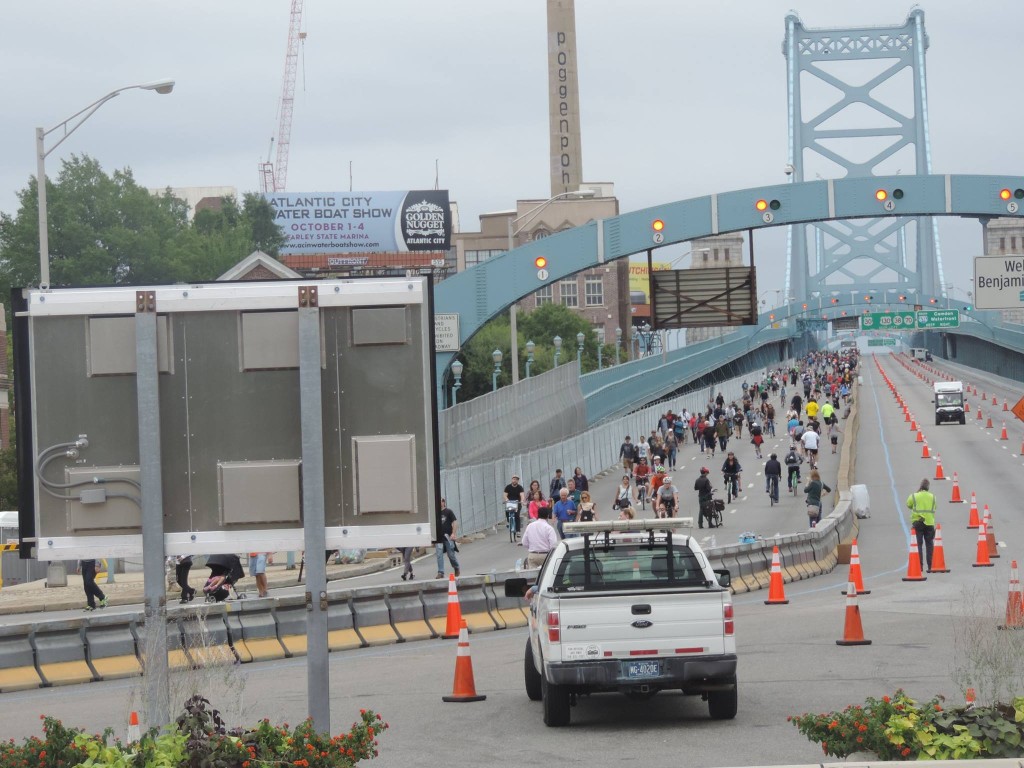
“These bike lanes came just in time…We now have another way for people to access the visit of the Pope this weekend.”
That was what Camden County Freeholder Jeffrey Nash told a crowd on Thursday September 24th, as the city of Camden, New Jersey hosted a ribbon cutting ceremony at the opening of four miles of bike facilities connecting the Cramer Hill neighborhood and the brand new Kroc Center to the Waterfront and the Ben Franklin Bridge.
But on the whole New Jersey prepared for the papal visit by going into total lockdown mode, and largely suffered because of it. Many of these security decisions were made in places like Newark and Mount Holly far away from devoted Pilgrims. It turns out that the planners knew a lot about running checkpoints, keeping order and looking out for bad actors. But no one seemed to be able to visualize the impact of these decisions on residents and people who traveled on foot or transit.
For example:
- Everyone who came in from Camden into the traffic box via PATCO, RiverLink Ferry and the Ben Franklin Bridge was subject to a bag check. There were no checkpoints into the traffic box from anywhere in Philadelphia or at SEPTA rail stations. Fortunately the light crowds made this issue irrelevant. But it was a strong disincentive for people to visit Camden
- The RiverLINK Ferry doubled its fare ($7 each way).
- NJ TRANSIT did not cross honor RiverLINE passes on substitute bus service.
People traveling by bicycle got hit especially hard. Many of the decisions concerning bikes on trains can only be described as onerous and arbitrary, especially since few of those trains were actually full:
- PATCO, the ferry and NJ TRANSIT kept their bicycle bans in place even though advanced ticket sales were well below capacity (<25%).
- NJ TRANSIT’s bus division took the extra step of removing bike racks from all of their buses for the weekend and then having to reinstall them in time for Monday morning.
- The Burlington County Bridge Commission closed the Tacony-Palmyra Bridge sidewalk for the entire weekend to people on for foot or bike. The bridge is 7 miles from the traffic box.
As a result, Downtown Camden was virtually deserted. No jumbotrons in Roosevelt Plaza, no food trucks on Market St, no children riding bikes on the Waterfront, no priests playing frisbee on Cooper St.

Market St in Camden next to Roosevelt Plaza. The purple line was meant to guide people to the RiverLINE platform.
The predicted wall to wall march on the Ben Franklin Bridge never materialized and by mid morning on Saturday people on the Philadelphia side began taking over the roadway, many of them were on Indego bikes. National Guard Troops were constantly reminding cyclists to walk their bikes, but when the crowds thinned the urge to ride on the bridge was too great. The party ended at the base of the bridge in Camden as they saw no activity beyond the toll plaza, knowing that they would have to go through a checkpoint to get back on the bridge.
The authorities and agencies involved will declare victory because everything went smoothly as planned, but the restrictions on bikes and transit forced many to stay home from the festivities and in some cases their jobs. Finally Camden lost a golden opportunity to show the world all the progress it has made in the past decade.
The next test is the Democratic National Convention in June. Let’s hope that the lessons learned from this weekend will allow Camden to shine.

Thanks for writing this. It’s such a regrettable shame that the authorities in NJ freaked people out so much that they stayed away.
Agreed with the article. I rode over the bridge early Sunday and aside from a few cyclists, I was alone except for plenty of police and guys with scary guns.